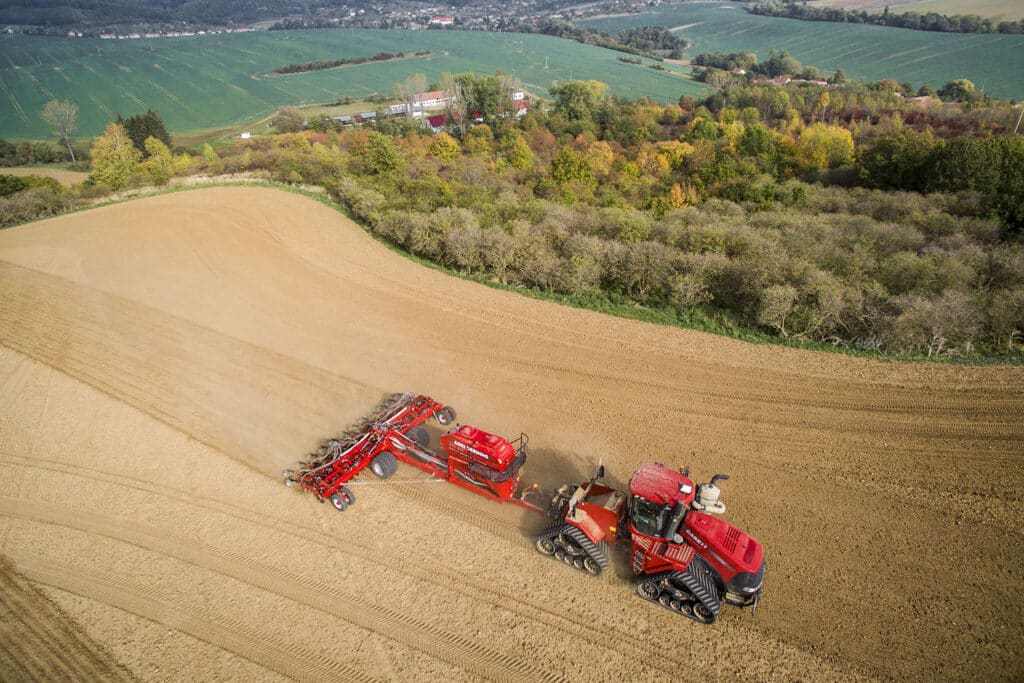What is strip-tillage?
February 16th, 2023
Strip-tillage is a fairly simple practice which has plenty of benefits for the soil and is an effective way for growers to start their regenerative farming journey.
In this blog, Rob Shepherd, sales manager at Sumo, introduces strip-till and its benefits and provides some top tips for those just getting started with the practice.
What is strip-till?
Strip-tilling is where the soil is prepared, and seed is drilled between strips of undisturbed ground. Usually, the strip-till machine will immediately follow the combine at harvest, in a single pass.
Compared to traditional tillage, this reduces disturbance significantly, and allows the soil to restructure itself.
Sumo’s DTS is a great machine for growers looking to strip-till. The multipurpose machine can be used for seedbed preparation, drilling, fertiliser applications, and reconsolidation – all in one pass.
The DTS includes a straight serrated leading disc, which ensures clean entry into the soil, reduced disturbance and reduced germination of weeds.
The DTS’s active contour following system, has a live flow of hydraulic power which keeps the machine fixed onto the soil surface.
This means in fields where ground is uneven, the seed isn’t drilled too deep or left on top of the surface, which can happen if a strip-till implement does not have the ability to contour-follow.
The benefits of strip-tilling
Strip-tillage has a wide variety of benefits, both for the soil and crop, as well as potential cost savings.
Building soil structure
With reduced disturbance, as a result of reduced tillage, strip-tilling can help growers to build up their soil quality by allowing soils to restructure themselves or maintain structure.
A good soil structure is an important foundation for crop establishment, but it can take a long time to build this up. Strip-tilling can help achieve better structure in soils, even to the degree needed to start direct drilling.
Water retention
Strip-tillage can help to increase water retention in soils. Undisturbed soils often hold water more efficiently than heavily tilled soil, as the structure is maintained.
This is particularly beneficial for growers who have faced the challenges of drought in recent years. Therefore, the practice can be seen as an insurance policy, providing crops with an extra element of support, should there be seasonal challenges through the growing season.
Cost savings
Another attractive benefit of strip-tillage is the associated cost saving. As the strip-till machine is often used in a single pass, after the combine, growers have the potential to save on costs associated with fuel, labour and maintenance normally associated with cultivation.
With the soil being minimally disturbed when strip-tilled, weed growth can also be suppressed. This can therefore help growers to reduce their reliance on herbicide applications, further helping to save on input costs.
Rob’s top tips for strip-till
Tip 1: Drip feed strip tilling into your system
Strip tillage is very simple in practice, but it is very different to traditional cultivation practices and can take a while to get used to. Therefore, Rob recommends that to start with, growers should focus on a few fields at first to get comfortable with the machine.
Tip 2: Prepare your soil before strip-tilling if needed
Although this may sound like counter-intuitive advice, you can prepare the soil before using a strip-till for the first time, if needed.
If residues from the previous crop are left and end up becoming clumped, it could present problems as these residues can hold moisture which attract pests such as slugs. Therefore, there may be a requirement to prepare the soil before strip-tilling for the first time. This will help ensure crops can establish in the best conditions.
If you do have residual clumps or are concerned about the presence of slugs, you can use a straw harrow such as the Sumo Strake. This involves dragging a harrow tine across the surface, which spreads residues, leaving a nice and even canopy of residues, holding a good level of moisture but importantly creating an environment which is less appealing to slugs.
Tip 3: Get more oxygen into the substructure using an LDS
To get crops off to the best start and to support the work of the strip-till, growers can use a Low Disturbance Subsoiler (LDS) to get more oxygen into the soil substructure.
This machine creates minimal disturbance on top of the soil surface, but can increase the level of oxygen in the soil by creating small gaps in the surface, around 6-8 inches deep, which allow oxygen to get in.
To learn more about strip-till, speak to your agronomist or contact the Sumo team.



